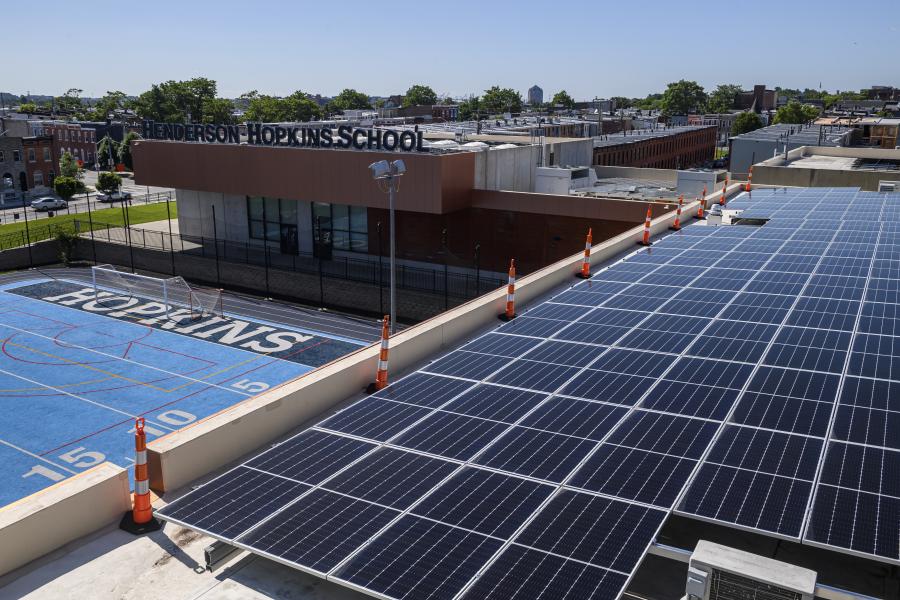Solar panel arrays are currently being installed on the roof of Elmer A. Henderson: A Johns Hopkins Partnership School will provide power to approximately 150 low- to moderate-income households in East Baltimore starting later this year. Participating families will receive a 20-25% discount on BGE electricity costs.
Henderson-Hopkins's solar panels are the first "Solar4Us" project from the Climate Access Fund, a non-profit green bank that develops and finances community solar projects in Maryland. During visit from Maryland Gov. Wes Moore last week, Henderson-Hopkins Principal Peter Kannam explained that the initiative will serve the dual purpose of reducing the community's energy burden and protecting the environment.
"It's going to help generations to come," he said. "We're a community school. We want to serve the community. [It's] a win, win, win for the community, for our students, for the environment."
Moore began his visit by speaking with Henderson-Hopkins students about their environmental concerns. He then signed an executive order to combat climate change and advance Maryland's Climate Pollution Reduction Plan.
Video credit: Aubrey Morse / Johns Hopkins University
"I can't think of a more appropriate place to be to be able to sign this important piece of this important executive order," Moore said. "[Henderson-Hopkins is] not waiting. They're acting. And Solar4Us reminds us that climate action is about much more than just avoiding disaster. ... It's also about what are we doing to unleash opportunities. Because we cannot ask people to get involved and get active in this work around climate justice by just simply telling them that they need to see themselves in the consequence of inaction. They need to see themselves as the beneficiaries."
Henderson-Hopkins is a contract school of Baltimore City Public Schools operated by Johns Hopkins and Morgan State universities. The more than 1,500 solar panels on the school's roof are expected to be officially connected to BGE's power grid later this summer. Funding for the panels came from a variety of sources, including the state, investors, crowdfunding, philanthropy, and private donors.
Over the next 30 years, the solar panels will offset an estimated 27,000 metric tons of CO2 and save the community at least $1.1 million. They will also create local jobs and provide experiential learning opportunities for the students at Henderson-Hopkins.
"Since 2018, the Climate Access Fund has been working to ensure that the clean energy economy is an inclusive one," Climate Access Fund founder and CEO Lynn Heller said. "We are deeply appreciative of our partnership with Henderson-Hopkins, as well as for the commitment of all of our funders and collaborators."
Image caption: Maryland Gov. Wes Moore meets with students before signing an executive order at Henderson-Hopkins.
Image credit: Will Kirk / Johns Hopkins University
Johns Hopkins School of Education Dean Christopher Morphew, who was among those in attendance Tuesday, remarked on how great the atmosphere was during the governor's visit.
"Every time I come to Henderson-Hopkins, it's about soaking up the energy. It's about seeing the work that's being done," Morphew said. "There's a lot of discussion in education circles about what it means to be a community school, but one of the things is certainly about giving back."
Income-eligible households interested in signing up for the solar power program can learn more online. In-person and virtual information sessions will also be held throughout the summer, including on June 7, 30, and 31.
For Kannam, who has been working on this project for four years, the solar panels are more than just a new addition to the roof. They're a step toward improving his students' futures.
"We're training our students to be advocates, leaders, [to] have a voice. And so, we want to get involved in projects to have a cleaner and greener Maryland," he said. "This is a first step, and I think other institutions like churches, schools, and other office buildings should jump on to this. That's how we can get to these climate goals."
Posted in Community
Tagged east baltimore, education, henderson-hopkins, solar power








